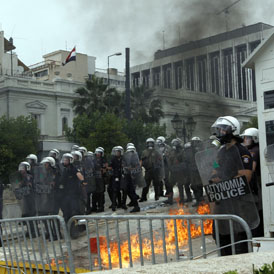Mass protests force Greek PM to offer resignation
The Greek Prime Minister offers to quit and make way for a national unity Government after protesters clash with police over austerity measures, as Jonathan Rugman reports.
Senior government sources said on Wednesday that Greek Prime Minister George Papandreou was willing to step aside if a unity cabinet agreed on a clear plan to meet the terms of an IMF/EU bailout.
According to reports the Prime Minister spoke to the opposition leader about the move in a bid to stabilise country rocked by debt.
The dramatic move came after euro zone finance ministers failed to agree on how to involve private investors in a second financial rescue for highly-indebted Greece, and senior EU officials said a deal was now unlikely to be reached at a summit next week and was likely to be delayed until mid-July.
Earlier on Wednesday, tens of thousands of angry Greeks massed outside parliament to demonstrate rising hostility against draconian spending cuts required to win a second bailout.

A number of protesters threw petrol bombs and clashed with police at buildings housing Greece’s finance ministry on the central Syntagma square in Athens.
Around 1,500 police blocked efforts by around 5,000 protesters to encircle parliament in an attempt to stop MPs voting on new austerity measures, during the third general strike this year.
Riot police created a corridor so lawmakers could drive up to the building in official limousines. Several demonstrators pelted Prime Minister Papandreou’s car with oranges as he drove past.
Unions representing about half of Greece’s five million-strong workforce stopped work for 24 hours. Trains stopped, ports closed and hospitals cut staffing. But airports stayed open.
Tax hikes and sell-offs to keep bailout deal
Prime Minister Papandreou is trying to push through a new five-year campaign of tax hikes, spending cuts and sell-offs of state property, in order to continue receiving aid from the European Union and International Monetary Fund and avoid default.
The deal aims to save 28bn euros (£24.6bn) in cuts and tax hikes to take effect from 2012 to 2015.
Greece has already planned 6.5bn euros in tax increases and spending cuts this year, doubling measures agreed with bailout lenders
Austerity measures have pushed unemployment to a record 16.2 per cent and extended a deep recession into its third year.
In order for the next set of rescue loans to go through, parliament must adopt the new austerity plan by the end of June.
It comes after the credit agency Standard & Poor’s downgraded the country from B to CCC, making it the least credit-worthy nation out of 131 countries it monitors.
The Greek Government said the downgrade ignored its efforts to secure funding.
The Government has appealed for national consensus on the laws, on which the EU and IMF have conditioned the release of another 12bn euros in aid next month
On Tuesday, eurozone finance ministers failed to reach agreement on how private holders of Greek debt should share the cost of a new bailout for Athens worth an estimated 120bn euros before a 23-24 June summit.